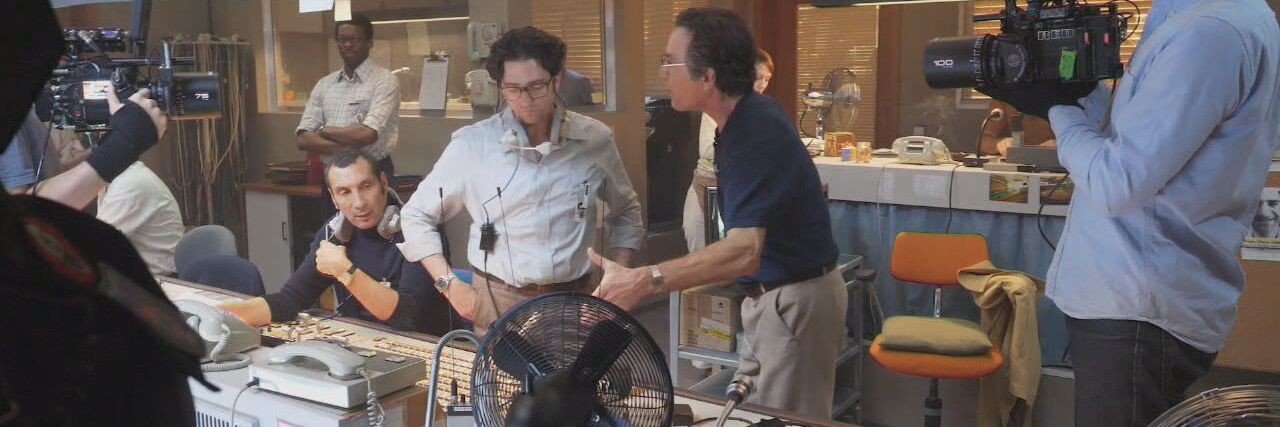The Oscar-Nominated Duo Behind 'September 5' Breaks Down The Vigorous Research Done To Achieve Historical Accuracy
September 5 director Tim Fehlbaum
The 1972 Munich massacre is not just one of the most tragic days in sports history. It is also one of the most important days in broadcast history. Over the course of 20 hours, a Palestinian militant organization infiltrated Germany’s Olympic camp, took 11 Israeli hostages and facilitated a violent exit plan. For the first time ever, the entire world got to see a violent terrorist attack unfold in real time. Although stations were eager to cover it for the sake of transparency, they also had to be careful with how they told the story. As a result, there were many incredible and innovative editorial decisions made behind the scenes that day. They are effectively captured in the thriller September 5.
Co-written and directed by Tim Fehlbaum, the film shows the events of that day experienced from the perspective of ABC’s sports crew assigned to cover those Olympics. Although, hard news is not the crew’s main area of expertise, when they realize that their satellite newsroom is right across the street from where the attack is taking place, they know they are literally in the best position to tell the story. Armed with nothing but their own wits, they band together to give the world a front row seat to an event that, unbeknownst to them, will change the world.
The massacre has been explored in both Kevin McDonald’s One Day In September and Steven Spielberg’s Munich. But as mentioned before, what brings this particular telling of the story to life is the unique perspective of the news crew. Speaking with FilmSpeak’s Dempsey Pillot both Fehlbaum, along with his co-writer and co-producer Moritz Binder, revealed that they stumbled upon the idea after speaking with Geoffrey Mason, one of the men who was in the control room that day. In a preliminary interview with the duo, Mason shed light on so many little-known dilemmas that the crew encountered that day that it seemed like that side of the story needed to be told.
Click below to watch the full interview with binder and fehlbaum, or continue scrolling for the remainder of the article.
“ The way [Mason] talked about his 22 hours was so interesting and detailed, “ Binder said. “Tim and I thought, ‘Okay, 'those questions they had to ask themselves that day and those obstacles, we can relate to as filmmakers.’ And we went deeper down into that research. And then we said, well, maybe this is not just like the topic. Maybe it's the perspective.”
Mason’s testimony was just tip of the iceberg for the duo though. Additional research included police records and accounts from journalists on-the-ground that day. And while it seemed like overkill, some of the most meticulous details they uncovered ended up being the basis for some of the film’s pivotal moments.
" There were a lot of biographies. There were also very, like a lot of scientific papers,” Binder said. For example, the head engineer, Joe Melz, who designed the studio lot. He wrote a book about the Olympics [and] the technical setup.”
That book featured a single sentence about another station wanting to use ABC’s feed during the initial hostage crisis. Yet in the film, that moment is a somewhat crucial plot point which demonstrates the crew’s understanding of how big the story and taking ownership of it.
Fehlbaum also revealed that he visited a modern day sports newsroom with actor John Magaro (who plays Mason in the film) to “ see how these dynamics are there, how people talk to each other, how the mannerisms are, and how the apparatus works.” Funny enough, if there was someone he felt looked like they really knew what they were doing and looked like they could be from the 1970s, he asked them to be a part of the shoot too.
Accuracy wasn’t the duo’s only goal with this film though. Other than the aforementioned films from MacDonald and Spielberg, the event feels like a vague memory in society’s rearview. Since the year it happened, even the Olympics has rarely acknowledged it. They wanted to keep the memory of this important moment in time alive. According to the Fehlbaum and Binder, however, Germany has not forgotten at all. As it turns out, the German government has an entire task force that is still working to this day to find out “ how many levels Germany failed that day.”
The duo had no clue until they screened the film for German officials. While it happened so many years ago, it appears that there is more interest in understanding what happened that day because it was in their backyard. Contextually, the 1972 Olympics was the second time since right before World War II that the country was hosting the event. Although it was hoping to make amends on the global stage, it ended up being the platform for another deadly tragedy.
“The whole event is still very present in Germany,” Binder said.




